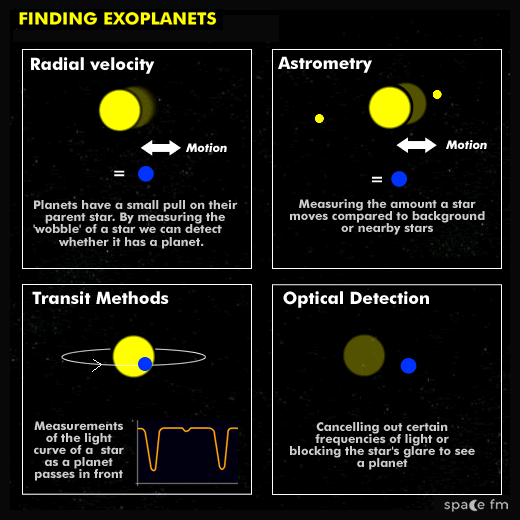Exoplanets
12.4 - Understand the current methods for discovering systems of exoplanets, including transit method, astrometry and radial velocity measurementsAlthough planets orbiting other stars (exoplanets, sometimes called extra solar planets) had long been theorised, there was no evidence for their existence until the mid-1990s.
Since then several hundred have been discovered and confirmed. The most common are normally described as ‘Hot Jupiters’, large bodies orbiting very closely to their parent star. More of these bodies have been discovered because they are easier to detect.
At least 2 exoplanets, Gliese 581c and d lie within a habitable zone where water can exist as a liquid. Exoplanet MOA-2007-BLG-192Lb w is also notable as it has a mass of 3.3 of Earth. These are known as ‘Super-Earths’.
Detecting exoplanets is difficult for a number of reasons:
- They orbit stars and the brightness of the star may prevent us from finding them.
- Planets may orbit too far away from our line of sight for some methods to detect them e.g. when their ecliptic is too eccentric for them to be noticed.
Different methods exist to detect them:
Transit Methods
As a planet moves in front of a star minute changes in light occur. Scientist can then work out the size and orbit of a planet
Astrometry
By measuring the position of a star very accurately, any minute wobble in the stars position can be due to the tiny pull of a planet on the parent star.
Radial velocity
Changes in the movement of a star towards and away from Earth can be detected using the Doppler effect.
There are other methods such as optical detection which involves observing a star but cancelling out different wavelengths of light to observe it. There is also gravitational lensing which uses the bending of light by gravity around stars to detect planets in that direction.
Did you know?
Scientists think that only certain parts of galaxies are capable of making stars capable of nurturing planets.
Questions
- Describe different methods used to detect exoplanets
- Why are scientists interested in discovering Earth-like planets elsewhere?
Activity
Research exoplanets and discover some of their unusual properties.
Links
- Planetary Society How to Search for Exoplanets
- Kepler - NASA Space Observatory detecting Exoplanets
- Exploplanet Exploration Number of detections by different methods


 | © All Rights Reserved |
| © All Rights Reserved |